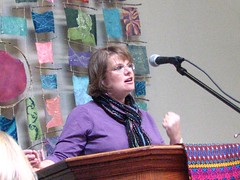Signals of Oddity: Muddling Through
Excerpts from a recent sermon by our dear sister, Karen...
...My professor and friend Roberta Bondi says: when it comes to prayer, the most important thing is to show up. But it's not as easy as it might sound, is it? Many of us would much prefer to have a shiny, cleaned-up version of our selves to present to God (and other church types).
The challenge then, is indeed, to show up as we are, to try to be as real as we can, as honest as we can be about who we are and be those true selves before God, however, whoever, we understand God to be – being as honest as we can there, too. There's a whole lot of ambiguity therein, requiring all manner of muddling, I think.
One thing I love about this church is that it is a place that gives us permission to show up and muddle through together with brothers and sisters, which is what we are doing this morning.
I chose the Prodigal Son as our gospel reading today, because it was already on my mind...
You know what prodigal really means, right? It means “excessive, lavish, extravagant”. And we attach this adjective with derision to the lost son. But the most prodigal character in this story is not that younger brother, you know, but, rather, the father.
If the son breaks the norms of society in acting prodigally, the father shatters those norms by his own prodigal behavior: his extravagant forgiveness, his lavish love, his excessive grace.. His son who has shamed him and the entire family should be dead to him. His honor, that commodity which was all-important socially, had been offended.
But the father who should have been nursing his wounded pride, was, instead, waiting and watching for the return of his son – like a Mama who cannot forget her baby... So when his boy finally did show up on the horizon, though he was still a long way off, Jesus says, this father spotted his son – even with that cataract in his left eye he knew his boy's walk, and, abandoning all pretense of dignity, he ran, yes ran (which dignified men did NOT do) he ran like a crazy old woman, kicking up enough dust to get his pristine white jellaba dirty, he RAN to meet his son and wrapped him in his arms.
By the time we get to the end of the story, we are not surprised to find that the Father's lavish, extravagant, embarassingly motherly prodigal love extends to his other son as well – the one who feels no need for grace, who doesn't realize that he needs forgiveness in his life, who doesn't realize how much is broken and unwell in his soul or in his family because he has worked so blastedly hard to keep things together on the farm that, by God, things better be in order or there'll be hell to pay in the morning. We see that the father does not condemn the older son for his hardness of heart any more than he condemned the younger one for his wantonness.
Rather, the father invites them both into the joy of relationship with him as his beloved children, bound together by a healing, “wholing” flow of grace.
The sparse language of the two sons in the parable makes the words they say telling. The younger son believes he is not worthy to be a son, and so will ask to simply be a servant/a slave – doulos (same word in Greek).
The older son spitefully reminds his father that he has worked like a slave for him all these years which ought to be worth something. But the father makes it plain to both of them that he does not want slaves, worthy or unworthy of their keep. He wants his own beloved children, just as they are, to show up, to come back to him, to join him in the circle of love and joy that is their true birthright as family...
To choose sonship, daughtership, our heritage of belovedness, is to let ourselves be caught up in the flow of God's prodigal love, to go with the flow, and trust it to keep flowing. And in the life of Jesus, we are invited to trust that the flow of grace will indeed keep on saving us from ourselves, that nothing will stop it – not even bony death.
For God is not some remote man upstairs who might quietly slip away and abandon us, but the Mother/Father who doesn't just promise to show up if we'll show up, but runs to meet us at every turn. In life, in death, and beyond death. Our loving God pours out forgiveness and grace upon our every breath, our every atom of being. God washes us with saving grace, and promises to hold us in love for eternity.


0 Comments:
Post a Comment
<< Home